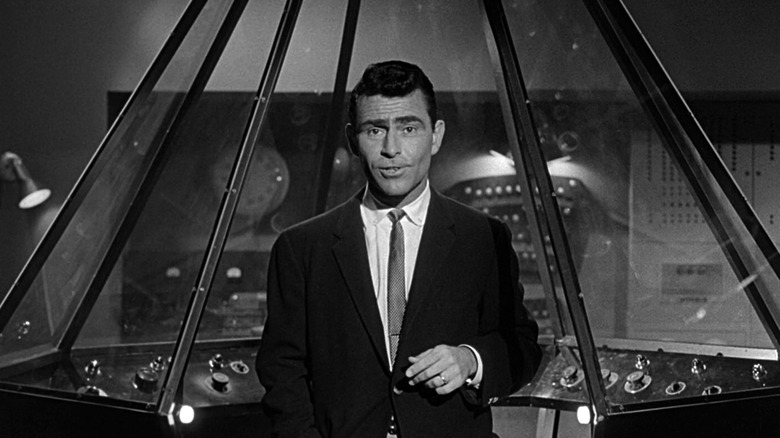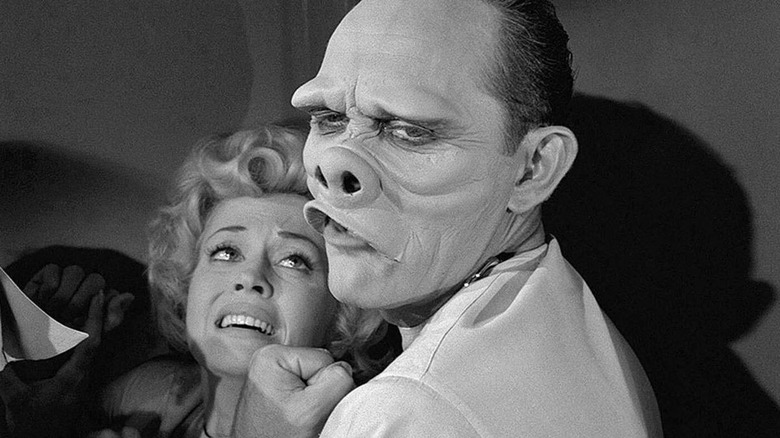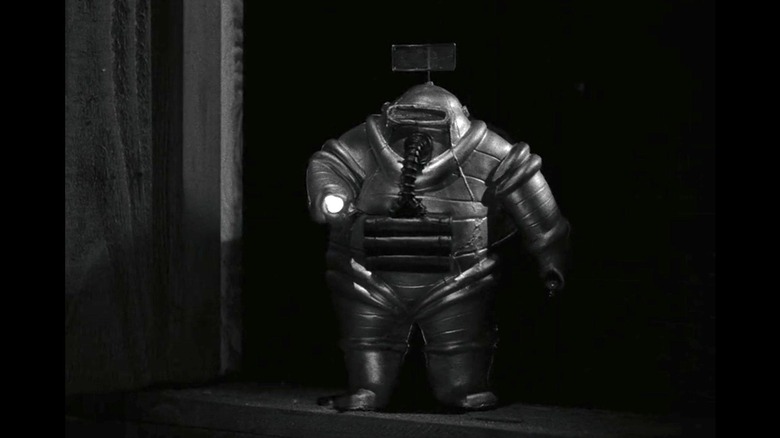Rod Serling’s eerie sci-fi anthology collection “The Twilight Zone” nonetheless, to at the present time, tops lists of the very best TV exhibits of all time. In a 2023 article in Selection, itemizing the 100 biggest exhibits of all time, it was listed at #14, simply behind “Succession,” though that rating smacks of recency bias. The #1 present on that record, by the way, was “I Love Lucy,” which is wholly right. Over right here on /Movie, we listed “The Twilight Zone” as the best horror TV present of all time, which can also be right. “Tales from the Crypt,” nevertheless, did not crack the highest 30, so we might must do some soul-searching.
The unique “Twilight Zone” ran from 1959 to 1964, which is an astonishingly long term for an anthology collection. In that point, the present attracted quite a few notable sci-fi writers and aspiring administrators, bringing style writing deeper into the pop consciousness. Serling turned a minor deity of kinds, showing on the heads and tails of “The Twilight Zone” to declare a stern ethical for a shaken viewers. Be simply and worry not, light viewers, else the universe will enact its personal type of karmic justice. “The Twilight Zone” turned mythic.
Rod Serling, nevertheless, felt that the present had its share of dregs. For each nice episode, there was a minimum of one horrible episode to steadiness it out.
In 1970, Serling held an on-camera interview with Professor James Gunn (to not be confused with the superhero filmmaker James Gunn), which was nearly misplaced to time. The interview was meant to be a part of a Centron interview collection, however it was canned when Centron could not purchase the rights to point out clips of “Twilight Zone” interviews. It was shelved and presumably misplaced to time. Years later, all that remained was a silent workprint. Fortunately, the audio parts have been found elsewhere, and restorers painstakingly re-synched them.
The interview revealed Serling’s opinions on the inconsistency of “The Twilight Zone,” largely springing from the present’s frustratingly low finances.
Good some weeks, dangerous different weeks
Six years after the present’s cancelation, Gunn requested Serling if he was finally happy with how “The Twilight Zone” turned out. Serling rapidly replied:
“By and huge. I feel it failed by way of its consistency. It was superb some weeks, fairly dangerous different weeks. However this I feel is just about the monitor report of most tv by advantage of its determined overexposure and the brevity of time allotted to us to supply one thing that’s qualitative. However total, I’d say that it was a inventive collection. We did way more creating than we did imitating. I feel we tried issues. We failed incessantly and succeeded different occasions.”
Serling theorized that “The Twilight Zone” lingered with viewers as a result of they might sense the present’s efforts to make one thing placing and new, even when they did not at all times succeed. He additionally mentioned that audiences have been drawn in as a result of they have been in a position to appeal to such all kinds of performing expertise … that might comply with work for reasonable. Serling admitted that, even when “The Twilight Zone” was allotted a much bigger finances, it nonetheless solely topped off at about $70,000 every week, which, he factors out, was far, far cheaper than trendy exhibits; Serling’s personal “Night time Gallery” spent $250,000 every week.
Later within the interview, Serling admitted that the budgets have been a problem. He envisioned one thing grander for “The Twilight Zone,” and he merely did not have the assets to make the visible results he wished. It wasn’t a matter of getting probably the most from each penny. It was merely a matter of not with the ability to do it. He mentioned:
“I’d by no means attempt to beat my head in opposition to the wall, making an attempt to come back in at an arbitrary finances on the time. We merely could not do it correctly. All we may use as a result of we could not afford opticals and could not afford montage results, have been little wind-up rubber males. I believed it completely destroyed the phantasm.”
That is a reference to “The Invaders,” one in every of Serling’s favourite episodes of the collection.
Rod Serling’s favourite episodes
Serling additionally confessed his two favourite episodes of “The Twilight Zone” within the interview with Gunn. He was very keen on the Richard Matheson-penned episode “The Invaders” (January 27, 1961). In “The Invaders,” an aged lady (Agnes Moorehead), dwelling alone in an remoted cabin, comes throughout a crashed flying saucer on her roof. The saucer is tiny, nevertheless, which means the aliens inside a lot be solely about 5 inches tall. Positive sufficient, she begins seeing miniature silvery astronauts creeping about her dwelling. She assaults them, they usually retaliate with high-tech weapons. The twist: the alien craft, actually, got here from Earth and landed on a planet populated by giants. Agnes Moorehead is a huge house alien.
Serling referred to as the episode “pure science fiction with a really O. Henry-ish twist.”
Serling’s different favourite was one he wrote himself, “Time Sufficient at Final” (November 20, 1959), primarily based on a brief story by Lynn Venable. That is the episode with Burgess Meredith as an introverted bookworm who hates how a lot his extroverted co-workers demand he cease studying. Whereas studying in a basement financial institution vault, the nuclear apocalypse strikes, killing everybody above. Meredith emerges to search out the library intact. He’s ecstatic. He lastly has the time and solitude he at all times wished to learn, learn, learn. Then his glasses break.
It was, in line with Serling, “sheer, pure, stunning irony.” He additionally mentioned that, “by way of manufacturing values,” the episode was “gorgeously completed.” He was in a position to movie the post-apocalypse scenes on the MGM backlot, and “it appeared like a film.”
Serling then lamented that Richard Matheson did not have the finances he wished. The showrunner love Matheson’s writing, however felt that the rubber robots have been just a little corny. Typically, one merely has to work with the finances they’re given.






